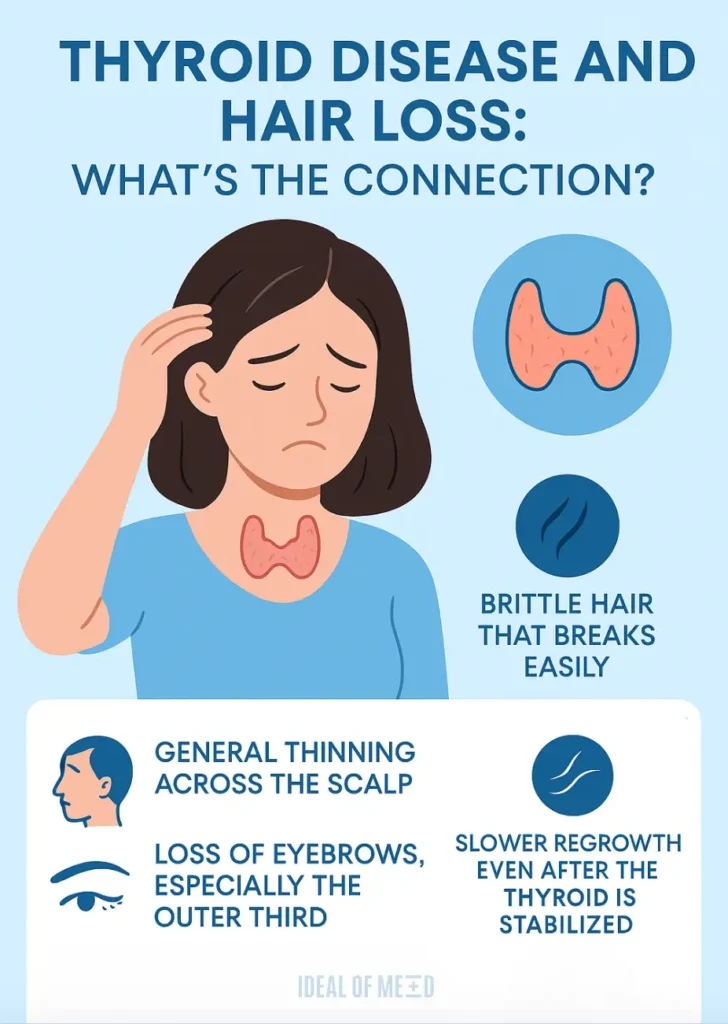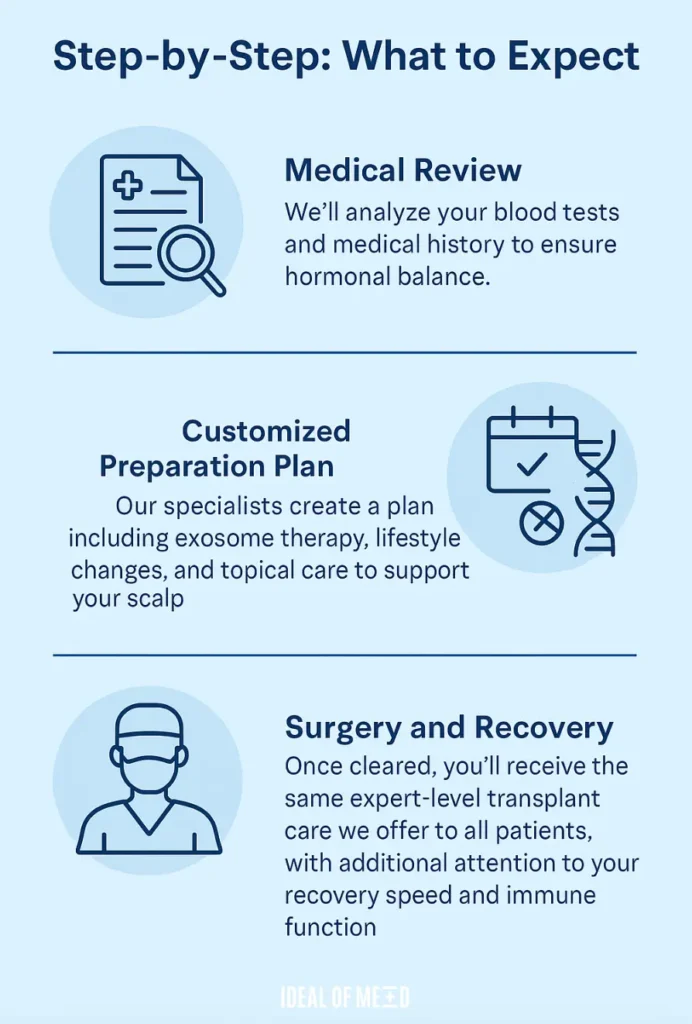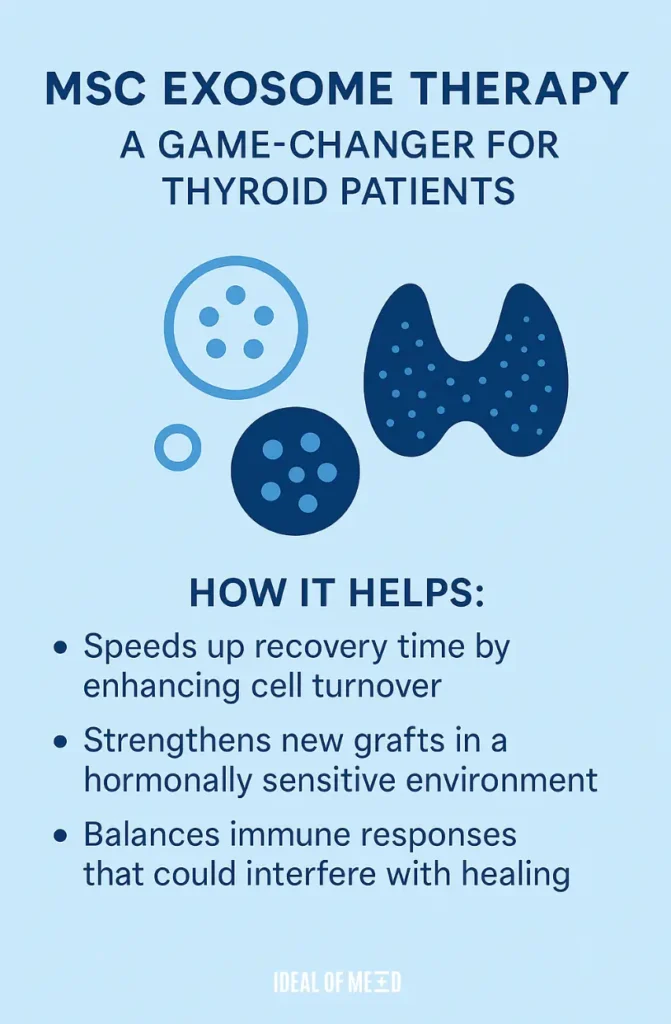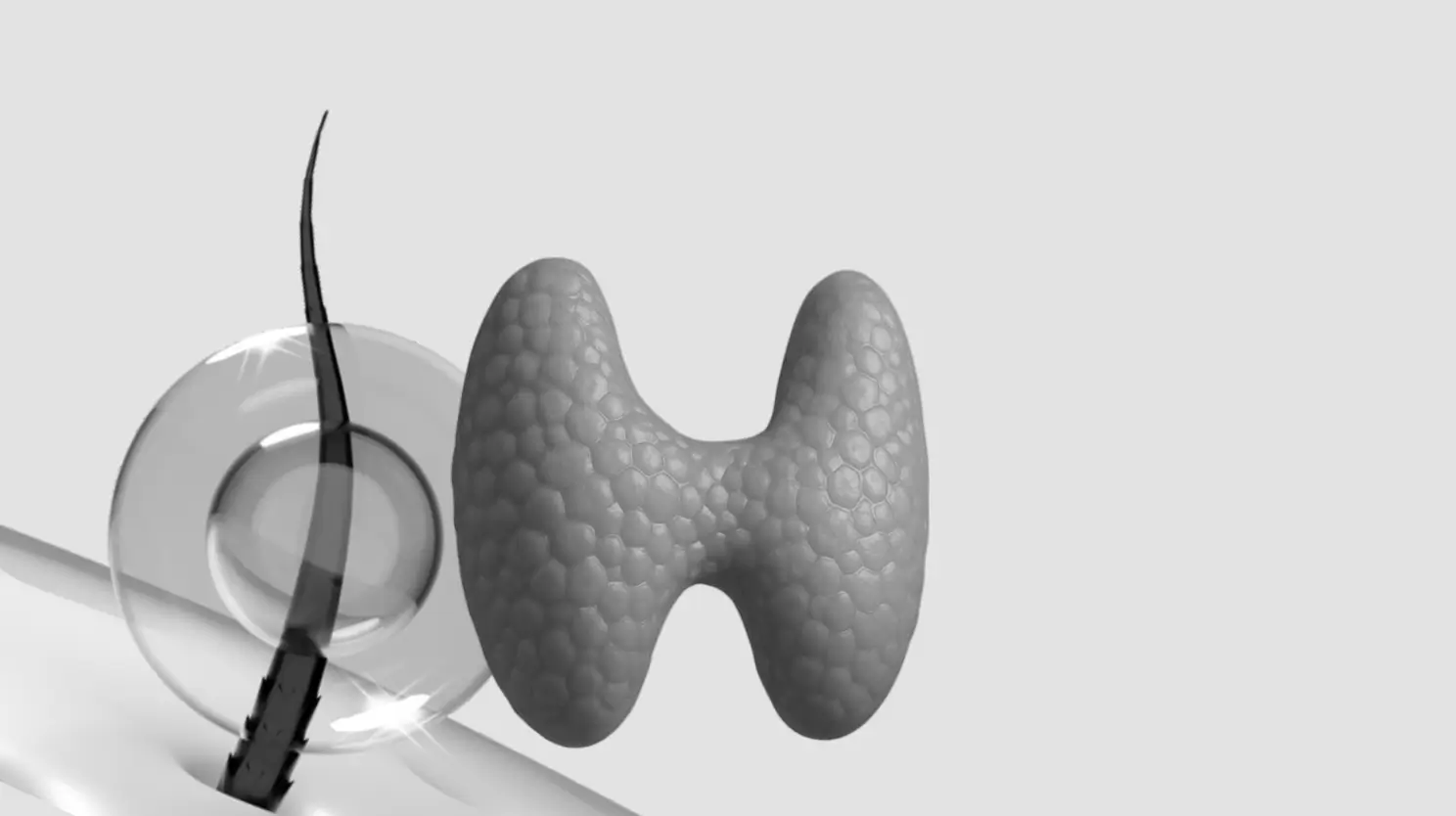Thinning hair, patchy loss, or overall volume reduction can be symptoms of an underlying thyroid issue. If you’ve been diagnosed with hypothyroidism or hyperthyroidism and are considering a hair transplant, you’re not alone. Many patients with thyroid-related hair loss wonder whether they’re eligible for surgery — and what steps they need to take for the best outcome. At Ideal of MeD, we specialize in treating complex cases with a holistic and medically sound approach.
Thyroid Disease and Hair Loss: What’s the Connection?

Your thyroid plays a key role in regulating metabolism, growth, and cell turnover — including the hair growth cycle. Both hypothyroidism (underactive thyroid) and hyperthyroidism (overactive thyroid) can disrupt the hair cycle, pushing follicles into a prolonged shedding or resting phase. The result? Diffuse thinning, slow regrowth, or even patchy baldness.
Some common signs of thyroid-related hair loss:
- General thinning across the scalp
- Loss of eyebrows, especially the outer third
- Brittle hair that breaks easily
- Slower regrowth even after the thyroid is stabilized
Can You Have a Hair Transplant with Thyroid Disease?
Yes — but only when your thyroid is stable.
At Ideal of MeD, we require patients with thyroid conditions to demonstrate stable hormone levels for at least 6 months prior to surgery. That means your TSH, T3, and T4 readings must be within normal range, and your symptoms — including hair loss — should be stable or improving.
Why? Because performing a transplant while your thyroid is still unregulated may lead to poor graft survival, excessive shedding, or delayed healing.
Pre-Treatment Protocol: What We Recommend

At Ideal of MeD, we go beyond the transplant itself. Here’s how we prepare your body and scalp for optimal healing and long-term success:
Thyroid Function Assessment
We review your bloodwork (TSH, Free T3/T4) and consult with your endocrinologist if needed to confirm stability.
Lifestyle Optimization
We help you fine-tune your routine with tips and information on:
- A thyroid-supportive diet rich in iodine, selenium, and zinc
- Stress-reduction techniques (yoga, meditation, adaptogens)
- Better sleep hygiene and reduced toxin exposure
Step 1: Medical Review
We’ll analyze your blood tests and medical history to ensure hormonal balance. If needed, we coordinate care with your doctor.
Step 2: Customized Preparation Plan
Our specialists create a plan including exosome therapy, lifestyle changes, and topical care to support your scalp.
Step 3: Surgery and Recovery
Once cleared, you’ll receive the same expert-level transplant care we offer to all patients, with additional attention to your recovery speed and immune function.
Special considerations for Thyroid Patients
While you may be a candidate for surgery, your case will require careful management. Here’s how thyroid-related hair loss can affect the transplant process:
- Delayed regrowth: Hair may take longer to cycle back into active growth compared to non-thyroid patients
- Sensitive scalp: Especially common in hypothyroid cases; requires gentle pre- and post-op care
- Fluctuating hormones: Can affect graft survival, which is why long-term endocrine stability is key
MSC Exosome Therapy: A Game-Changer for Thyroid Patients

Ideal of MeD is a leader in regenerative therapies. We offer MSC Exosome Therapy both before and after surgery to accelerate healing, reduce inflammation, and support graft survival — especially important for patients with a history of thyroid issues.
How It Helps:
- Speeds up recovery time by enhancing cell turnover
- Strengthens new grafts in a hormonally sensitive environment
- Balances immune responses that could interfere with healing
Post-Transplant Recovery for Thyroid Patients
Expect a slightly longer timeline for visible results — typically 6 to 12 months, depending on your thyroid health and adherence to post-op care.
Do’s and Don’ts:
- Follow your medication regimen strictly
- Keep inflammation low through diet and stress management
- Moisturize and clean your scalp per instructions
- Don’t skip check-ups — even mild hormone shifts can affect your outcome
- Avoid harsh hair products or treatments in the healing phase
Our take: Avoid hormone disruptors in food, plastics, and skincare. These can negatively affect your hormonal balance and scalp health long-term.
Book a free consultation with our hair specialists and we’ll send you our exclusive guide on hormone disruptors — so you can protect your results from the inside out.
Understanding Your Thyroid Lab Results
| Test | What It Measures | What It Means | Ideal Range |
|---|---|---|---|
| TSH | Thyroid-Stimulating Hormone – tells your thyroid how hard to work | High TSH = underactive thyroid (hypo); Low TSH = overactive thyroid (hyper) | 0.4 – 4.0 mIU/L |
| Free T3 | Active form of triiodothyronine – controls metabolism & energy | Low levels can cause fatigue, hair thinning, weight gain | Varies by lab (e.g. 2.0–4.4 pg/mL) |
| Free T4 | Active thyroxine – helps regulate your metabolic rate | Low levels = possible hypothyroidism; high = possible hyperthyroidism | Varies by lab (e.g. 0.8–1.8 ng/dL) |
Final Thoughts
A hair transplant can work for people with thyroid conditions — but only if your hormones are well-controlled and your body is prepared to heal. At Ideal of MeD, we combine medical expertise, regenerative therapies, and lifestyle-based care to give you the best chance at long-lasting, natural results.
Curious if you’re a candidate? Book your free consultation with Ideal of MeD and let our experts guide you.
FAQ: Hair Transplants for Thyroid-Related Hair Loss
Yes, if your condition is well-managed and your hormone levels have been stable for at least 6 months.
You’ll need TSH, Free T3, and Free T4 results to confirm hormonal balance. Additional markers may be requested.
MSC Exosome Therapy reduces inflammation, strengthens hair follicles, and supports recovery in hormonally sensitive individuals.
Possibly — but with stable hormones, healthy lifestyle choices, and proper aftercare, excellent results are still achievable.




